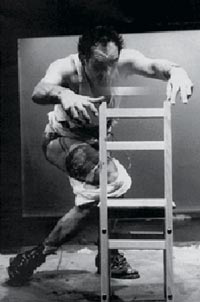| Man.Chair was developed as
work in progress piece in a form of public rehearsal with no
premiere. The research was based on the repetitive capacity of
authentic performance Man.Chair, performed for
the first time by Damir Bartol Indos in 1982. We wonted to
reconstruct, remake, remix and upgrade the original piece (which is
screened on video) using dance improvisations and individual
approaches of dancers towards the technical and semiotic
characteristics of the original performance Man.Chair. The aim was to
build a theatrical structure from the performance art piece (which
was never meant to be repeated) trough the dance
variations.
Man.Chair is a musically
structured dance-impro performance, which avoids any thematic
fulfilment. There are, rather, some parameters or rudimentary
relation between body and object. In the process of development
performers are focusing on the following
parameters:
 -
Resemblance between physical characteristics of object and
body -
Resemblance between physical characteristics of object and
body
 -
Mental investment of energy and emotion in object -
Mental investment of energy and emotion in object
 - Objectification of body - Objectification of body
 - Tension between “technical” and “natural”
bodies - Tension between “technical” and “natural”
bodies
 -
Tension between order of objects and order of bodies -
Tension between order of objects and order of bodies
…Goran Sergej Pristas and Ivana Sajko
have founded the “nameless author’s company” that fills the public
with enthusiasm by their dance (P. Knezovic, Jutarnji
list)
It
is neither a theatrical nor a dancing show, it is not either a
performance or a pantomimic piece, yet it combines all the elements
– it is an interesting unconscious play that arises upon
differences, a sort of conflict between Indos and his age, his
experience different from those of Nikolina Bujas Pristas and
Pravdan Devlahovic and their stories. (N. Ozegovic, Jutarnji
list)
The
place for the play and for the viewers is the stage of &TD, the
only scenery of this intimate but very successful experiment are the
walls painted in black oil paint. Three bodies dressed in white
underwear and three broken chairs make, let us call it that way, an
existential hexagon – twitching movements, nervous tics, and
stylized masturbation are symptoms of fear from one’s own sexuality
which says: it is impossible to communicate with another living
being if one does not start reigning over him or else if one is not
subordinated by him (T. Cadez, Globus)
Touching dance dialogues… the performances of this kind are
not only desired and expected delicacies but also the viewers’
curiosities, the curiosities that are not only several hundred
kilometres away from our cultural climate but even some hundred
spiritual miles away (I. Djerdj, Glas
Slavonije) |


